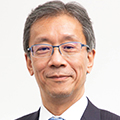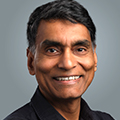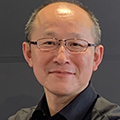Plenary Speaker

Toward the Great Convergence - beyond the silicon-based AI
Dr. Teruo Fujii is the 31st President of the University of Tokyo (UTokyo). He was previously the Executive Vice President in charge of finance and external relations for the university and took the office of the President on April 1, 2021. He has also served as an Executive Member (part-time) of the Japanese Cabinet Office's Council for Science, Technology and Innovation from March 2021 until February 2024.
Dr. Fujii received his Ph.D. in engineering from UTokyo in 1993. His research specializes in applied microfluidics systems and underwater technology.
The hype of generative AI has led to the huge demand for silicon-based advanced semiconductor devices, and rapid increase in the number of data centers around the world. Even with the cutting-edge semiconductor technologies with high computation efficiency, this trend will be contrary to the idea of sustainability in terms of energy consumption. On the other hand, there's literally a living example of computing machines, i.e., biological computation running in living organisms with very low energy consumption. Here I would like to show the pioneering works in the field of molecular computing based on microfluidic technologies, that is opening up new ways of computation beyond the silicon-based devices. And the strong needs for the great convergence between bio-, silicon- and quantum technologies in the intelligent age will be discussed.

AI in the Future of Computing
Jeff Burns is the Director of AI Compute and the Director of the IBM Research AI Hardware Center. He manages IBM Research’s activities in AI accelerators including architecture, software, applications, and integration of advanced technologies and packaging. Upon joining IBM Research at the T.J. Watson Research Center he initially worked in layout automation and processor design. Subsequently he has managed teams and projects in VLSI design, design automation, microprocessors, systems architecture, and AI. He received his B.S. in Engineering from UCLA, and his M.S. and Ph.D. in Electrical Engineering from U.C. Berkeley.
The capabilities of Generative AI and Large Language Models have been advancing at an extraordinary rate over the last few years. Enterprise workloads, running on classical digital infrastructures, can be augmented and improved by Gen AI, provided it can be seamlessly integrated from both software and hardware perspectives. The computational demands of AI have been increasing exponentially, requiring massive amounts of additional compute capacity via GPUs and AI accelerators. To fully address the challenges and opportunities of combining enterprise computing with Gen AI, both hardware advances in AI compute acceleration, and software advances to enable ease of programming and use, are essential. In this talk I will share some of our work in IBM Research on creating and integrating AI hardware and software innovations to power future advances in enterprise computing.

AI and AC for a New Computational Age
Vivek Singh is VP Advanced Technology at NVIDIA, working to improve the computations involved in the design and manufacture of semiconductors, using accelerated computing and AI. He was previously an Intel Fellow and Director of their Computational Imaging Department, leading the development of industry-first solutions in diffractive optics, microscopic inspection, and chip design. Vivek is an SPIE Fellow. He served as president of the Lithography Workshop, honorary visiting professor at Jawaharlal Nehru University in New Delhi, and founding member and chair of the Design Technology Co-Optimization conference in SPIE. Vivek has a B.Tech. from IIT Delhi and a Ph.D. from Stanford.
Chip manufacturing gets more complex every year, and fundamental physics dampens our desire for continued scaling. The solutions to this problem often involve more precise modeling and intricate optimization strategies, across multiple modules in the Fab. It is clear that if there is a “law” that governs the annual increase in Fab computation, it has an exponent greater than Moore’s Law ever did. Accelerated Computing (AC) helps solve this problem by drastically reducing the cost and energy required for these computations, thereby making possible previously prohibitive techniques and precision. On top of that, Artificial Intelligence (AI) methods, with their increasing ability to describe the physical world, have started to prove themselves in real world situations. This talk will describe the problem, some solutions, and give examples of how AC and AI are moving into production in advanced Fabs.

AI and TSMC Design Technology Platform.
Takuya Yasui is the Director of TSMC’s Design and Technology Platform and leads the Japan Design Center. Since joining TSMC in 2020, he has successfully established the Japan Design Center, developed an advanced technology Design Platform, and provided customer support leveraging this platform. After 1993 graduate of Hiroshima University, he began his career at Matsushita Electric Industrial Co., Ltd. (now Panasonic Corporation), specializing in semiconductor methodology, physical design, and ASIC development. In 2015, he transitioned to Socionext, a joint venture between Panasonic and Fujitsu, where he held the position of General Manager of the Physical Design Implementation Division.
As the demand for lower power consumption and higher processing speeds continues to accelerate in the fields of Artificial Intelligence (AI) and High-Performance Computing (HPC), semiconductor scaling has become increasingly challenging. This presentation will discuss TSMC's cutting-edge efforts in addressing these challenges, with a focus on the critical role and significance of Design and Technology Co-optimization (DTCO) in state-of-the-art semiconductor technology. Furthermore, it will explore the innovative applications of AI in semiconductor design and the development of advanced design environments. Lastly, the presentation will highlight TSMC's strategic initiatives and contributions in Japan.
